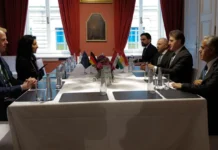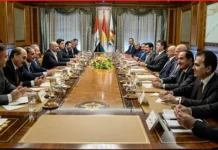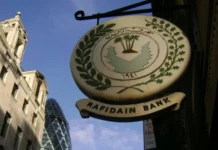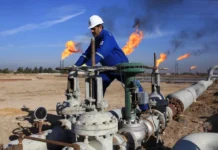Dollar Alternative
The Government Is Out Of The Equation. Gold Swallows The Iraqi Dinar And Becomes A “Money Laundering” Currency.
Economy / Special Files 10-16-2025, 11:00 PM | 2135 Baghdad Today – Baghdad Iraq is witnessing an unprecedented surge in gold prices, amid a decline in the state’s monetary instruments and growing indications of the expanding influence of parallel financial networks exploiting market and legal loopholes. This crisis, which began in a market influenced by the London and New York stock exchanges, has become a mirror of the broader crisis of confidence plaguing the Iraqi economy.
Experts believe that the yellow metal is no longer a commodity tied solely to supply and demand, but rather a precise indicator of the deep imbalance between monetary policy and the real economy, and of the government’s failure to protect the market from waves of speculation and currency smuggling.
Economic expert Nasser Al-Kanani explained to Baghdad Today that “the continuous rise in gold prices in the local market is directly due to global price fluctuations.
Iraq does not possess the tools to intervene or the ability to control this market, which is governed by global stock exchanges.” He pointed out that “the absence of local gold production has made the country hostage to fluctuations in foreign markets.
Every rise in London or New York is immediately reflected in Baghdad, Najaf, and Basra, without any government capacity to mitigate its severity.”
Economic observers confirm that the continuation of this situation means that Iraqi monetary policy is operating in a completely exposed environment, and that the Central Bank has lost the ability to manage price balance after markets began operating according to the logic of global supply and uncontrolled local demand.
Al-Kanani adds, “Geopolitical factors andUS interest rate decisions, along withdollar movements in the markets, are the main drivers of gold prices currently,while the Iraqi government is limited to a regulatory role through the Central Bank and the Tax Authority, without any real tools for control.”
Financial researchers point out that this reality reflects the fragility of the Iraqi economy, which relies entirely on imports and lacks internal protection strategies or monetary balancing policies that allow it to absorb shocks.
This has forced the local market to operate on the principle of absolute freedom of trade, without a balance between economic freedom and the equirements of financial stability. Amid this situation, citizens are increasingly turning to gold as a means of savings,as confidence in the dinar declines and its exchange rate fluctuates against the dollar.
Al-Kanani warned that “random speculation on gold is exacerbating the crisis, as it raises local demand to unrealistic levels and increases pressure on prices,” adding that the government has lost the ability to control this wave, at a time when prices fluctuate daily based on the general mood of speculators, not on well-considered economic decisions.”
Financial market observers confirm that citizens’ behavior toward gold has become a direct reaction to the weakness of financial and banking institutions, and that the loss of confidence in the national currency has pushed the popular economy to seek alternatives that preserve value, even if they are outside the control of the state.
On the other hand, the gold crisis intersects with what anti-corruption expert Yassin al-Taie calls the “prestige economy,” meaning the use of illicit funds to build a new social image known as “reputation laundering,” a phenomenon that has become synonymous with money laundering in recent years.
Al-Taie told Baghdad Today, “There is a close connection between money laundering and reputation laundering.
Both are part of a single strategy pursued by influential actors in the black economy, aimed at circumventing the law and obtaining social cover that allows them to expand in the economic and political spheres.”
Observers point out that this shift in the behavior of those with illicit capital reflects a change in the form of corruption itself, as its goal is no longer solely to gain unlawful enrichment, but rather to build a network of influence that fortifies corruption within societal institutions.
Al-Taie explains that “these entities resort to establishing commercial companies that appear legitimate, or financing cultural and charitable events, to gain the trust of society and grant themselves moral immunity that prevents them from being held accountable.”
Oversight experts say that these practices have distorted the local economic environment and eroded trust in public institutions, as corruption is no longer hidden or confined to government agencies,
but has permeated the public sphere under the banner of charitable work and civic investment. Al-Taie adds that “some entities are taking advantage of loopholes in the laws and their relationships with influential circles to expand their activities without oversight,”
which observers see as a clear threat to the principles of institutional justice and equal economic opportunity.
Economists believe that the combination of loss of monetary control, money laundering, and reputational damage represents a dangerous example of what is known as the “dual economy,”where the formal economy operates according to state rules, while the parallel economy operates according to private interests.
Observers assert that the gold market today is the legal front for the parallel economy. Through it, money is recycled and its sources are concealed, while all transactions appear legitimate on paper.” They point out that this phenomenon “keeps the state in the position of a bystander while informal money circulates freely within institutions.”
Economic researchers argue that addressing the crisis requires rebuilding oversight mechanisms for gold trade and imports, linking them to a unified financial tracking system overseen by the Central Bank and the Anti-Money Laundering Authority, similar to that implemented by European Union countries.
Economists point out that “the existence of a national registry for gold traders that requires them to disclose their sources of funding will help block smuggling and money laundering networks,” adding that “the absence of this type of transparency makes the market an ideal place to funnel illicit capital under the guise of legitimate trade.”
Observers agree that continuing this path will deepen the loss of confidence in the national currency and transform gold into an alternative currency outside the banking system.
This will constrain the Central Bank‘s ability to manage liquidity and increase the likelihood of Iraq being exposed to new international financial pressures.
Economists believe that “the country needs a flexible and integrated monetary policy that links financial stability with security oversight of financial movements,” while anti-corruption experts assert that “any reform that does not address reputational damage with the same seriousness as money laundering will remain merely superficial.”
According to economic observers, “the crisis has gone beyond the market stage to become a national crisis of confidence,” noting that gold today is no longer merely a measure of wealth, but rather “an indicator of the state’s vulnerability to unregulated money.”
Researchers assert that regaining control of the gold market is not simply a matter of price, but rather a test of the government’s ability to restore discipline to its financial system and prevent wealth from becoming a means of influence and the economy from becoming a vehicle for organized corruption. https://baghdadtoday.news/285348-.html
By 40%, The Central Bank Is Committed To Implementing Comprehensive Strategic Banking Reforms.
Economy | 12:59 – 17/10/2025 Mawazine News – Economy Prime Minister’s Advisor Saleh Mahoud Salman affirmed on Friday that the government is proceeding with comprehensive strategic banking reforms, noting that the government is committed to continuing to implement the economic and financial reform program.
In a speech delivered during his participation as a representative of the government in the banking reform conference organized by the Central Bank of Iraq in cooperation with the international consulting firm Oliver Wyman at the Ritz Carlton Hotel in Washington, DC, on the sidelines of the meetings of the International Monetary Fund and the World Bank, Mahoud said,
“The government is committed to continuing to implement the economic and financial reform program aimed at enhancing the efficiency of the banking system and supporting sustainable development in the country.”
He stressed that “the banking sector represents a fundamental pillar in the economic reform process,” indicating that “the government is proceeding with implementing comprehensive strategic banking reforms in cooperation with the Central Bank of Iraq, aimed at raising the standards of banking work and enhancing the competitiveness of the financial system.
” ]He explained that “the government has prepared a three-year general budget for the first time, which allows for long-term financial planning, achieving stability in resource management, and enhancing the confidence of local and international investors.”
Within the framework of diversifying revenues and reducing dependence on oil, he indicated that “the government has achieved tangible progress in automating the customs system through the implementation of the United Nations ASYCUDA system, which has led to a clear increase in customs revenues in addition to a significant improvement in tax revenues,” noting that
“The government has implemented a program to restructure state-owned banks (Rafidain, Rashid, Industrial, and Agricultural) in cooperation with international consulting firms, with the aim of raising their efficiency and enhancing their ability to provide modern financial services.”
He pointed out that “the government has launched programs to expand the use of electronic payments and partnerships with financial technology companies, which has contributed to raising the rate of financial inclusion to more than 40%, up from less than 10% two years ago.
This has been praised by the World Bank and the International Monetary Fund.” He emphasized “the government’s support for small and medium-sized enterprises by providing financing and resources to create new job opportunities and stimulate the local economy.”
Salman stated that “the banking reforms currently underway represent a pivotal moment in Iraq’s economic development history, and that the government is determined to support all local and international institutions working to develop the banking sector, considering it a pivotal part of the plan for economic growth and financial stability.” He noted that “the government expressed its appreciation to the Central Bank, the banks, and the international and local advisory teams working in this field.” https://www.mawazin.net/Details.aspx?jimare=268633
For current and reliable Iraqi news please visit: https://www.bondladyscorner.com






